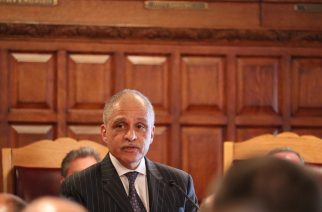
Former congressman Dennis Kucinich speaks at a press conference on Wednesday, accompanied by actor James Cromwell, center, and several members of Protect Orange County.
Former Ohio congressman Dennis Kucinich has asked for a new review process for a power plant under construction in Orange County which has been mired in controversy since last fall when the U.S. Attorney’s Office alleged that a top Cuomo aide was taking bribes from the company.
Kucinich and other opponents of the 650-megawatt, natural gas-fired power plant near Middletown also denounced the environmental impact the facility would have on the community and said there is a “disconnect” between the governor’s climate goals and permitting the plan’t construction.
Competitive Power Ventures Valley Energy Project is now under construction on a 122-acre parcel near Interstate 84 and Route 17 in Orange County. It will receive gas from the proposed Millennium Valley Lateral pipeline, which is still awaiting approval from the state Department of Environmental Conservation, and convert it to electricity.
Opponents of the project are not only concerned about the potential environmental impact, but also its role in an ongoing corruption case involving a former top aide to the governor.
“The moment this project was explained to me, it had corruption written all over it,” said Kucinich, who first learned of CPV’s project two years ago. “If top assistants to the governor are under investigation, why haven’t the permits been revoked?”
The investigation in question was led by Preet Bharara, U.S. attorney for the Southern District of New York, and ended in corruption charges against two of Governor Cuomo’s top aides, Joseph Percoco and Todd Howe. Percoco stands accused of soliciting and taking more than $300,000 in bribes from two companies, one of them being CPV; Howe, who was accused of arranging the bribes, is cooperating with the investigation and has pleaded guilty to extortion, wire fraud, and other charges.
“The governor should’ve froze everything as soon as questions were asked. It’s a massive injustice. That’s why I came here,” Kucinich said. “Anybody with an ounce of integrity in the Legislature would investigate this.
“It was totally inappropriate and a total violation of ethics,” Kucinich said. “Tammany Hall and Boss Tweed may be gone, but the political rot lives on in Albany.”
He went on to criticize the project’s apparent greenhouse gas pollution and groundwater contamination, saying that CPV would be “ransacking some of the most pristine land in the country.”
At one point, Kucinich called out Cuomo by name and asked why New York law permits the importing and use of fracked gas while forbidding its production inside the state. That earned him a round of applause from those present.
Kucinich was joined by experts and activists at the Albany press conference.
Actor James Cromwell was also present as one of the “Wawayanda Six,” a group of protestors who were arrested in December 2015 for blocking traffic around the project site. The group was fined $375 each and ordered to complete 16 hours of community service by yesterday. Cromwell chose not to.
“[I] will choose jail over stupidity,” he said.
Several speakers provided a scientific perspective, often referring to PowerPoint slides for data illustrations.
Keith Schue, an electrical engineer, criticized New York’s energy plan for relying on natural gas over renewables.
“What we’re seeing is a very lopsided energy portfolio here,” Schue said, referring to last year’s energy production, when natural gas generated almost as much electricity as all other sources combined. “Renewables, yes, there’s some growth in renewables, but there’s not enough.”
Dr. Anthony Ingraffea, an engineering professor at Cornell University, forecasts that the plant would emit 4.7 million tons of carbon dioxide and methane every year — a 10 percent increase in emissions from the state’s entire electricity sector. Dr. Robert Howarth, an environmental professor at Cornell, spoke about climate change and the emissions footprint of shale gas.
Others offered insight into the on-going activism against CPV’s project.
Pramilla Malick, the chairwoman of Protect Orange County, explained the local impact the project would have.
“It is not only massive itself, but necessitates a vast network of infrastructure that creates an even greater impact footprint, spanning from Pennsylvania to New York and including 100 to 150 fracking wells,” she said.
Valeria Gheorgiu, an attorney for POC, outlined the climate necessity defense, which she plans to use in court while representing the Wawayanda Six. The defense, a recent addition to the tools used by environmental lawyers, attempts to justify civil disobedience and other protest actions by arguing that no other options to protect the environment were left. It has never succeeded in an American court.
“It is my hope that the future justices who will hear our argument as we appeal, on behalf of the Wawayanda Six, will be inspired to make history and grant the climate necessity defense to the Wawayanda Six for the first time in this nation, and around the world,” said Georgiu.
George Billard, a member of Sullivan County Residents Against Millennium, spoke against the project’s compressors, their projected air pollution and their effects on residents’ health. Billard’s group opposes the Millennium Pipeline, a proposed natural gas pipeline running from Canada to Mount Vernon that would cut through significant wildlife habitats. The CPV plant would require a connection to the Millennium Pipeline to operate.
“Sullivan County is 61st out of 62 counties for health. I’d like to ask our legislators and Governor Cuomo, how does this help us?” said Billard.
Following the press conference, Protect Orange County met with other groups to deliver a letter to Cuomo asking him to halt further action on the project.
The DEC has until August to either deny the permit for the Millennium Valley Lateral pipeline or waive its rights under the Clean Water Act.









